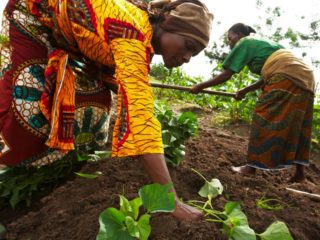AfDB plans $24bn investments in food security across Africa
African Development Bank (AfDB) has announced plans to
invest $24 billion in agriculture over the next 10 years as part of an effort
to unlock the Africa’s agriculture potential and assure food security across
the continent.
Dr. Akinwumi Adesina, President of the bank, disclosed this at
a side event of the ongoing Borlaug Dialogue International Symposium in Des
Moines, Iowa, USA yesterday.
Adesina spoke on the need for supportive public policies and
significant investments in infrastructure, especially for roads, irrigation,
storage, warehousing and agro-processing, adding that AfDB is willing and ready
to provide support to strengthen African agricultural research and development
systems to play significant roles in the transformation processes.
He said AfDB’s support will ensure that valuable research no
longer gathers dust on the shelves of academia. Adesina said AfDB’s Feed Africa
strategy had launched the Transformation of the African Savannah Initiatives
(TASI) to help unlock the potential of the Savannas of Africa.
He said the initiative would start by bringing approximately
two million hectares of savannah in eight African countries – Ghana, Guinea,
Democratic Republic of Congo, Central African Republic, Uganda, Kenya, Zambia
and Mozambique.
These countries come under the cultivation of maize, soybean
and livestock production in optimum conditions.
“Success in this endeavor requires that we wake up the
savannas of Africa. When we do so, African agriculture will indeed rise up from
its slumber. Let’s wake up Africa’s savannas and turn them into the new wealth
zones of Africa and unleash Africa as a global powerhouse in food. Together let
arise and feed Africa.
“Valuable research must meet the needs of farmers and
agri-businesses in ways that exponentially increase productivity and improve
the quality of lives of our rural poor. Africa must learn from the experiences
that have worked elsewhere, while tailoring the interventions to the specific
realities of Africa.
“We must ensure that small, medium scale and large-scale
commercial farmers co-exist in a way that allows opportunities for all. Partnerships
in research and development will be crucial,” Adesina said.
(NAN)




Comments
Post a Comment